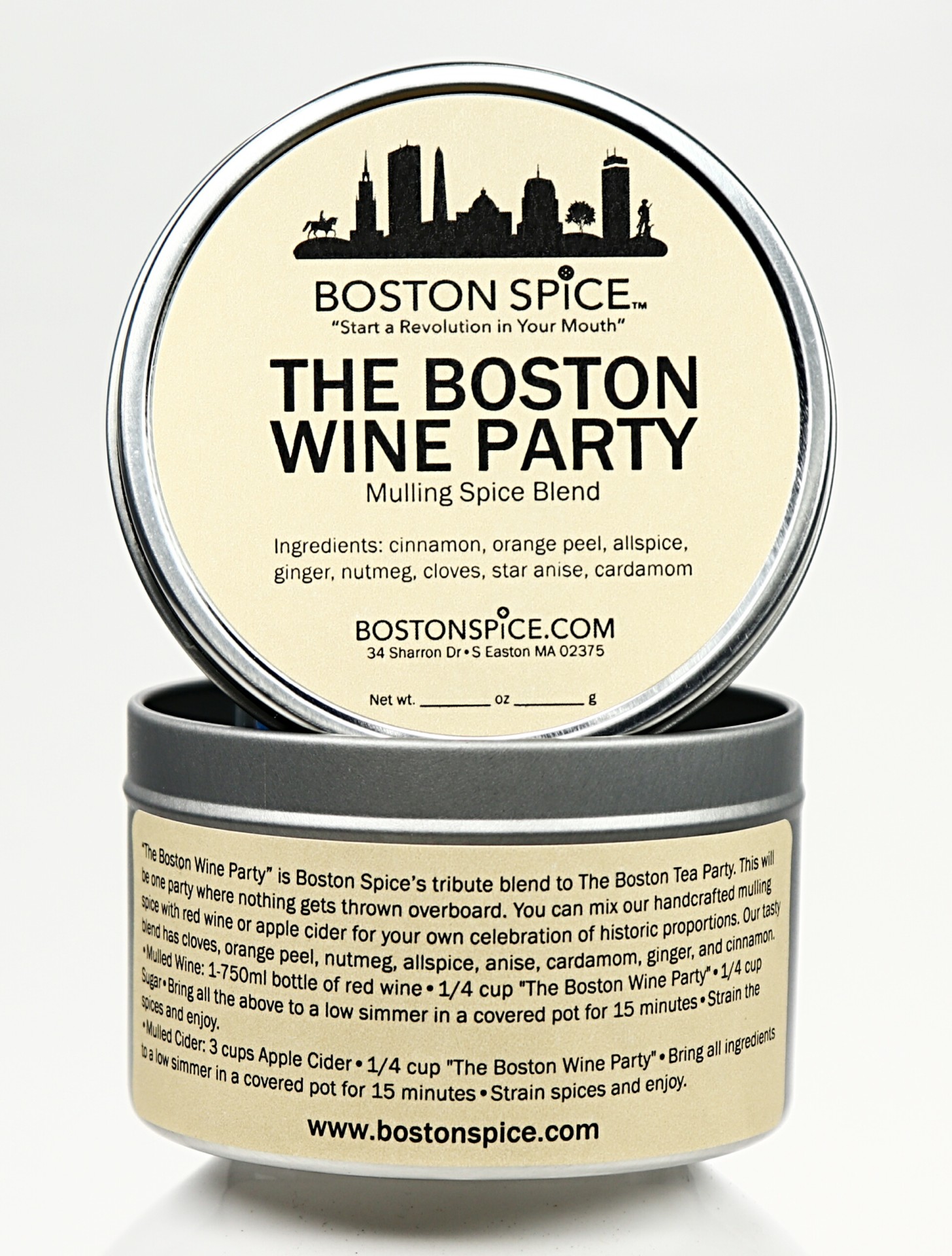It has been said that variety is the spice of life, but for those who make spices, it may be their variety of products and approaches that truly allows them to make a living.
Spices have been used for millennia around the world to add flavor and health benefits to food. If they did not improve a person’s health, spices were also used for funerary rites and other sacrifices.

In addition to being part of our pantries, spices also worked their way into our vocabulary as well. The phrase ”worth your salt” came from the fact that Roman soldiers were actually paid in salt, which was (and remains) a valuable food preservative. In fact, the Latin word for salt – “salarium” – is the root of our word “salary”!
Speaking of salaries, many continue to make them using these ancient ingredients.
Among those who still treasure the history of their wares is Steven Bortnick of Boston Spice (www.bostonspice.com). Each one of his over 80 custom blends comes not only with its own hand-made fresh flavors but also with a bit of history that explains where the spice’s name came from and what inspired it.
“We teach people a little…history and reasonings for each of our spice blends,” Bortnick explains, offering as an example the popular corned beef spice called “Southie” in honor of the historic Irish immigrant population in South Boston.
“According to historian James Cullen,” Bortnick explains, “a large number of Irish immigrants arrived in Boston as early as 1654…and were sold into indentured servitude. Since then, the Irish have become one of the largest ethnic groups in Boston and the annual St. Patrick’s Day Parade is stuff of legend, just as so many historic activities in Boston are.
As it is impossible to speak of Boston history without mentioning the American Revolution, Bortnick also offers such flavors as the Battle Road and Bloody Rebellion rubs, Bunker Hill BBQ blend, and the Gadsden-inspired duo of Don’t Tread on My Chicken and Don’t Tread on My Fish.

As for his company’s historic story, Bortnick recalls graduating from the fames culinary program at nearby Johnson & Wales University and becoming a chef and kitchen manager for a major area chain.
“During my 12 years of managing the back of the house and front of the house working all night shifts, weekends, and holidays…[I] got tired of cooking and serving flavorless food.”
Suggesting that many corporate-made restaurant recipes are, “pretty bland in general” and decrying the fact that, in many cases, adjustments are not allowed, Bortnick fell back on his early understanding that “adding something to food to make it flavorful is the most basic of cooking” and opted to toss in his toq and go out on his own.
“I decided that I will have to help people make their food taste good,” he beams, noting his corporate slogan, “Start A Revolution In Your Mouth”
Though many of his mixes are broadly applicable, Bortnick knows that many home chefs are wary to use new flavors and so offers not only names that hint at suggested uses but also a collection of “Yummy” recipes on his website.
“Most people decide what spice blends to use based on the food they are going to cook,” he observes, decrying how many grab old spices or gloppy sauces off the shelf and cover up their food instead of bringing out its best. “We try to give some meaning as to why our spice blends are tasty and fun. We might not be able to teach someone how to physically cook their food, but we sure can help them make their food flavorful.”
Though most of his flavors are locally-inspired, Bortnick is selling on his website and also through Amazon, etsy, and Walmart. To expand his reach and also his sense of “fun,” he has also partnered with local venues like the Boston Tea Party Ship and Museum, the Boston Stone Gift Shop, and the Town Of Lexington Visitors Center in Lexington Mass (home of the :shot heard ‘round the world”). He has also partnered with a local vintner to offer kits that combine wine and mulling spices.
“We call it ‘The Boston Wine Party,’” Bortnick smiles.
Focusing more on the health benefits of spices, Adit Agrawal, President & CEO of AlcoEats. (https://alcoeats.com/) explains that his company was born of his personal history of being unhealthy.
When he arrived in the United States in 2013 from his native India to attend Kettering University in Flint, MI (an area that has had its own health issues of late), Agarwal says, “I was super obese and did not really know a way out.”
Over time, the new student also educated himself about healthy eating and used spices to flavor what might otherwise be bland “diet” foods.
“With this came the idea of developing easy to use spice mixes that are diet friendly, easy to use, more gourmet and all natural,” he explains.
And while he realized that the spice space would be “hard to crack,” Agarwal was dedicated to using spices to “make a difference in the lives of others who want to improve their lifestyle or just want to eat the best tasting food possible.”
While he has seen many products that are easy to use, gourmet, easily relatable to consumers, and beneficial to their health, Agarwal posits that few if any satisfy all of these qualifications. The differnce with Alco, he suggests, is that, “we have thought about the customers first and have worked backwards to create something that fits perfectly well with their lifestyle.”
Though this may seem to be a grand claim, as the company’s “first customer,” Agrawal can attest to its verity.
Among the biggest challenges that Agarwal had fulfilling his desires to fuilfill the list of qualifications was the relatablility of his India-inspired products to an American market.
“Not many American’s grow up eating Indian food,” he admits, citing what are often “foreign” words like Tikka or Anchari. “We have made sure that we make our products relatable so it’s very easy for our customers to choose between flavors such as chicken or meat, spicy, creamy or buttery.”
In this way, Agarwal suggests, Alco has become more than a food company, but has gone on to educate consumers and encourage them to make healthy choices that, pardoning the pun. “mix well with their lifestyle.”
In addiiton to his website, Agarwal’s offerings are also available on Amazon and at a growing number of stores, especially in the Midwest.
“We have some amazing partners that help us reach our customers,” Agarwal says gratefully. Proudly noting that AlcoEats was recently named a Golden ticket winner by the wholesale food distributor KeHe. “We are working around the clock with them to distribute our products nationwide…[and] to be a staple in every pantry across America.
As Agarwal started his company to deal with his own health issues and those of others, Christina Lehman of From Gracie’s Table (www.fromgraciestable.com) opened her’s when many people were facing health issues of their own.
“I started my line of rubs during Covid as a side job while I wasn’t working as a physical therapist assistant,” Lehman recalls, noting that she took the name of her company from her late mother, Marygrace, who had often inspired her in the kitchen.
As a mother of two children who were unable to go to school, Lehman had to find an opportunity that would allow her to provide for her family while having the flexibility to be home with her children.
“I started to think of what I do differently then other people,” she recalls, echoing another famous saying about necessity and a mother, “and that where my rubs came into the picture.”
As she had been making her rubs and other food enhancers for many years and had received raves from family and friends, Lehman was confident that she could at least make some money with her culinary creations, or at least that she could offer something new to flavor fans.
“I’ve always heard from anyone who has [eaten] my dishes at my house that they never tasted anything like my rubs [and] marinades,” she smiles, “ so I was trying to bring something new and delicious as well as versatile to people.”
And while the money has been of great value to Lehman and her family, the true kick she gets from kicking up the flavor for others is the opportunity to do what she loves and have others fall in love with it as well.
“Cooking [is] a passion,” she enthuses, “and to have people buying items that only I can produce and loving them is an amazing feeling!”
As is the case with many food makers, however, Lehman faced challenges along the road. Chief among these was obtaining the proper licenses to expand her homemade business into a corporate entity.
“Once I had that in place,” she recalls, “the next hurdle was figuring out how to get my products to an audience.”
As her mother had inspired the business, Lehman turned to her father to help her grow it.
“[He] went around marketing our products to local farm stands,” she explains, “and I did the social media.”
Even so, Lehman recalls, it took some time for her spicy business to catch fire.
“I was constantly trying to figure out how we get more exposure,” she admits. “We needed to figure out how to get recurring customers to keep the line going and growing.”
As it was such a challenge to go it alone, Lehman called on other entrepreneurs in her area of Brookline, NH, and eventually created a collaborative market called Brookline’s Finest. In addition to her own products, Brookline’s Finest also offers such locally-sourced items as handmade wood items, homemade candles, fresh breads, hand painted signs, and other artistic and artisan items.
“It’s quickly become a favorite local hot spot,” Lehman observes, noting that, as soon as she has even more space and more licenses, she hopes to open up her own ready-made food store so people can see all the things her spices and other products can do.
As all individual spiced makers are entrepreneurs, it may be no surprise to learn that one of the most successful came from that hotbed of entrepreneurial spirit- the Wharton School at the University of PA.
Victoria Taylor, Founder & CEO of Victoria Gourmet, Inc. (www.VGourmet.com) grew up near Brown University, went to Harvard and then on to Wharton. And while many of her Ivy league classmates may have gone into finance and investment banking, Taylor decided to invest in herself and follow a dream.
Starting her food path as a product manager for the Kingsford Products Company (where she managed the national roll-out of KC Masterpiece BBQ sauce), she went on to Welch’s where she managed the company’s bottled juice business and authored their Welch’s Health and Nutrition Marketing Initiative. In 1998, she left the corporate food world and reentered the space as her own entity.
Despite her business background, Taylor faced the same financial challenges that so many self-starters do. In fact, when asked what her biggest challenges were, she admits that, “the recurring need for capital remains top of the list.”
With a team of over a baker’s dozen of investors, as well as debt financing and a working capital line at a small bank. Taylor was able to persevere and see her dream come to reality. And despite lawsuits, a fire, and what she sees as “terrible buyers” (not to mention a supply chain that, she suggests, is “broken” all over the planet), she has “never accepted the idea of failure as a possibility” and continues to battle every day.
Read Also: Lee Meyers Joins Fresh N’ Lean as Chief Marketing Officer
Apparently she is winning the war!
Today, Victoria’s spices can be found at over 4,000 retailers across North America (including Whole Foods, Market Basket, HEB, Meijer, Stop&Shop, Roche Bros, and even TJMaxx) and are purchased in bulk by many restaurants (such as Olive Garden, Legal Sea Foods, and The Capital Grille).
Despite this retail success, however, Taylor still has parts of her dream yet to realize.
“I would love to see by business continue to shift toward direct to consumer sales,” she says. “It’s a labor intensive channel, but that is where the closest relationships live.”
As with other spice-makers, Taylor also sees an unfamiliarity with spices as a potential obstacle for relationships with consumers.
“Most people are intimidated by spices,” she suggests, offering her own recipes (many of which have been collected in her book, Because Flavor is Everything ~ Recipes with Victoria Taylor’s) as a point of entry and means of education. “I believe it’s the recipes we provide that inspire confidence and lead to creativity.”
When asked what makes her products different, Taylor cites the careful testing each all-natural, gluten-free item goes through and also the low-salt formulations that set them apart from many other spice brands. She also uses larger piece sizes to enable higher volatile oil content and thus more flavor.
“This is a significant difference versus the finely-ground products commonly found in the market,” she maintains.
Among her most standout spices are pioneering Culinary Salts of the World Collection, which won a gold medal four “outstanding food gift” from the Specialty Food Association in 2003 and an industry-leading set of brining blends that she released in 2005. In addition to her many awards and accolades, these and other favorites have garnered Victoria thousands of social media followers and (perhaps more importantly) devoted followers who only use her products in their recipes.
“The essence of the consumer connection is easy recipes and inspiring solutions for cooking with maximum flavor every day,” Taylor suggests. “[Our] company maintains an ongoing commitment to recipe development as the foundation for connecting to consumers.”
Whether it was due to the growth of home cooking during the pandemic or a dedication to making food and life more delicious, these brave entrepreneurs have used their home-grown and international inspirations to spice up their own lives and those of others, bringing not only variety but also health benefits and inspiration for other sin the food space as well. And while many still may not think much about spices, it is clear that they have an impact on the flavor of food and on life.








